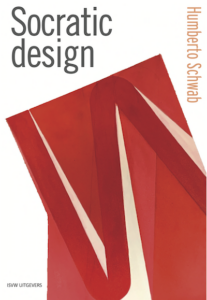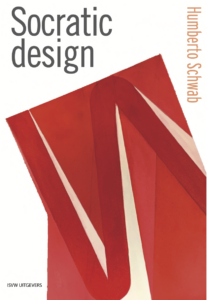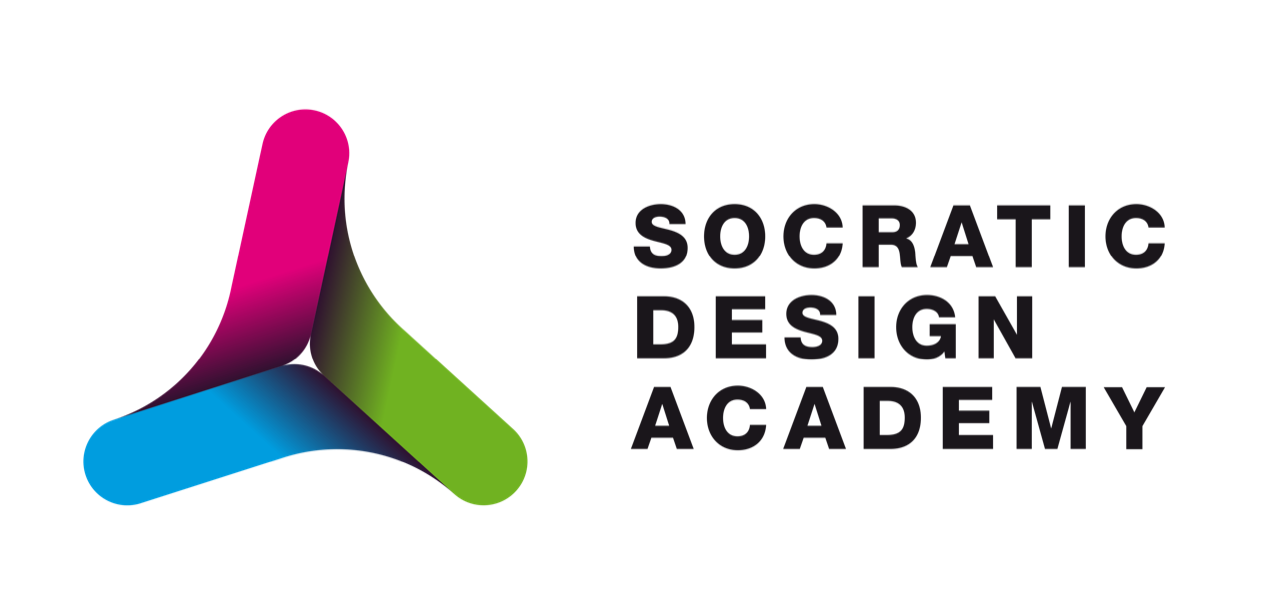Socratic Design – Enlightening the dark matter
By Canay Atalay, officially published in the Harvard Business Review Turkey, November 2017.
Canay Atalay’s journey of enlightening the dark matter within companies using Socratic Design. “Philosophy is not only to theorise about the world, but also to change it. Purpose of philosophy is to articulate the real problems that exist, but have not yet been articulated. (…) True transformation seeks to destroy false conscience, and articulates something in the present that beckons the future.”

After working for almost two decades with small and big companies, universities, impact organisations, municipalities and governmental bodies -defining their goals, strategies, services, communications, business models and digital transformations-, I noticed a dead end for each change program, what I like to call ‘Dark Matter’; an epidemic unknown zone where people- regardless of their rank, background, gender and role- show different levels of resistance to change and collaboration for innovation. This resistance sometimes came from individuals for example; a CEO refusing to act on a new roadmap, instead distributing responsibility to executives without authority, or from a collective group such as a technology department not delivering the promised developments to the marketing department, during a disruptive digital transformation program in a highly competitive environment.
On paper, everything looked good in our processes and methods; we were designing together with decision makers in the companies representing all the involved departments- in design thinking workshops, think tanks, and meetings with world-class designers and strategists using human centric methodologies. Participants were agreeing on the outcomes and setting the KPI’s together with immediate approval of the decision makers. Still the dark matter was in place. The main question I had was why were people not collaborating on their own designs and desired futures? After reflecting on it, I realised; what typically happens is that business people will want to talk about their products, their delivery systems, and their profitability models. But what tears businesses apart aren’t necessarily those kinds of things. What tear them apart is people that don’t get along with one another; they have different values, addictive thoughts and beliefs that create separation rather than collaboration.
In 2016, I came across a robust and coherent philosophical model, the Socratic Design Method. It was revolutionary in my quest to enlighten the Dark Matter of human’s individual nature, how we influence each other, how we collaborate or fail to do so. According to model creator, physicist and who is now my philosopher Humberto Schwab, Socratic Design’s mission is to free people and organisations from the burden of unproductive or even destructive procedures, unclear language, old thoughts, silo thinking and wrong assumptions. After all, to create new futures based on strong new values, we must be in a state of virginal thinking, not as a stand alone, but as a hyper creative collective. Since my encounter with this practical and very effective method, I have been getting philosophical training from Humberto to become a Socratic Designer, acting as a global ambassador of Socratic Design and applying it to my business as well as to my life.
How does philosophy apply to business?
For too long, philosophy-bashing has been keen to follow the mantra of ‘too much talk, not enough action’ in the field of business (remember ‘Don’t philosophise with me’ saying in our culture). This is not, however, surprising if you approach philosophy with the same instrumentality that dominates business. Philosophy pursues questions rather than answers them. In this sense, the responsibility of philosophy is not so much to answer our questions, but to question our given answers. Philosophy is not some kind of recipe or precept. Nevertheless, the placement of the concept of morality or justice under an investigative lens can help us move beyond the confinements of prevailing knowledge. This is the essence of the discipline of philosophy – it teaches not what to think, but how to think. It examines the enduring fundamental questions concerning human life, society, ethics and knowledge, just to name a few. Whereas, the business discipline represents a definite ordering of the world through the fabrication of concepts, methods and models as a way to reduce complexity, philosophy explores its conceptual framework and developments. A generic framework of business for problem-solving speed up the process of finding a solution, but it is at the expense of autonomous thinking. In this way, philosophy can help articulate the blind spots of business by looking behind its assumed certainties and theoretical preconditions. By pondering the questions which are beyond the scope of business, philosophy can broaden the reflectivity-horizon of future business leaders to help them manage complexity and make sound decisions, not only in the purview of good business, but also in accordance with the needs of society.
We are facing a singularity point in our culture and in our economy. Some of the main reasons driving this change are; exponential technological development (impossible to master by human linear thinking), big data explosion, end of the coal and steel era, end of classical hierarchical organisations, change from industrial forces to informational forces, demographic changes, geo strategically ruptures, revolutions in sciences with impact on the human self image, collapse of classical pillars in economical approaches, deep change cultures and values, change in paradigms of personhood and personal life…All these changes are mostly trying to be addressed with classical approaches which mainly contain the assumptions of the old world, that we want to leave behind. People think that they need to think deeper and better, in think tanks, brainstorm sessions, retreats and so on. But the problem lies in our thoughts and deep convictions; it is a wrong approach of the possibility of thinking. We all are reproducing the same addictive thoughts over and over again and projects these as reality. A lot of meetings and think tanks will result in producing the same old stuff in new clothes, costing time, energy, money and opportunity.
Only when we can think “from scratch” we can create new horizons, new futures, new plans and new goals.
Any company wants to leave behind as quickly as possible its old strong approach which is now a burden in disguise. We want companies to be young and fresh, flexible to the tsunami of change. These can only be realised when we transform the people involved in a deep dive of collective transformative thinking, in which we do not solve problems (that are reproductive), but in which we create new lines of meaning and understanding of the missions that can be implied in our activities.
With Socratic Design we do not transfer step-by-step from the old problems to something new, we radically change the way we communicate, dialogue and think together.
Socratic Design for innovation
In Socratic Design, we observe 3 common problems most of the organisations have that are the biggest barriers in front of innovation, all around the world;
1-Fragmented organisations
Many organisations are fragmented by separate departments, different disciplines of thinking, values and procedures or just non-communicative transactions. In order to create new products, services and apps we need a strong-shared base of common intelligence. We all want fast and strong new innovations, but being on the surface of these super speed currents, bears the risk of a speedy disappearance.
2-Thoughts instead of thinking
When we have a thought, we have the sensation that we really ‘think’. Unfortunately we are just ‘rehearsing’ the same thought over and over again. These thoughts are addictive and provoke a release of endorphin. This is also the main reason why we cannot listen to other people; we transform the thoughts expressed into our own familiar thoughts.
3- Fragmented personalities
In order to create real quality for good life practices, we need to be in a state of ‘clear mind’. But not only our surroundings are fragmented, we have incorporated these fragmented ideas and thoughts. We mirror our surroundings. When the car forces us to put on a safety belt, we will act like responsible drivers. When the workplace radiates distrust by cameras, electric gates, and checkpoints, we feel more distrustful and possibly act like it. Our mind is full of ‘environmental & cultural assumptions’, such as; ‘People are selfish’, ‘Man is to another man a wolf’, ‘Academics have more wisdom’, ‘Manual labour is lower then brain labour’, ‘Men are rational beings’ and ‘Abstract things are more truthful then concrete stuff.’
Coherent Communities Create Coherent Futures
We need to architect our organisations and institutions for flexibility and adaptability. Existing incentive models in business focus heavily on short-term indicators like quarterly earnings and are not set up for long-term changes. Almost all of our leadership globally is set up to manage an incremental, predictable, status quo, linear world designed by few for the benefit of the few. But we’re entering a totally unknown era; and we need to architect completely new institutions.
With Socratic Design, we first form a collective mind; this mind generates new perspectives that connect with deep human needs, in a highest neo cortex level of collaborative thinking. In this context different silos and departments can come together in a new value landscape and a pristine way of thinking. When the group is at its best it creates new concrete practices for the company and for clients. These practices, products and services will also change the people living with it and make businesses future proof as ‘Art of Social Businesses’.* (See diagram below)
[/vc_column_text][/vc_column]
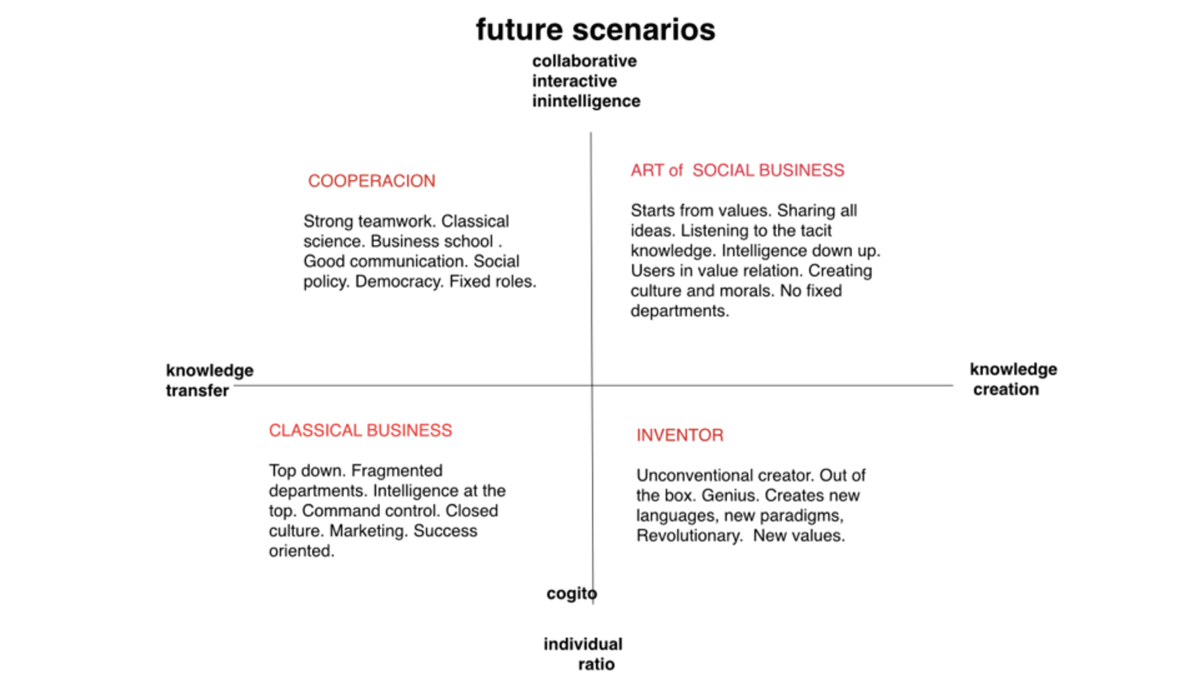
Socratic Design services
1-Communication & Collaboration:
In companies, the way the strategy is translated into communication and procedures is key. Because of the crucial relevance of good communication (‘comunicare’ in Greek, means making community) it is important to train people to facilitate dialogues, not debates nor discussions. Often departments have become silos and a lot of the procedures, rituals and fixed traditions can be solutions to problems that also no longer are present.
Communication is more complex than many of us assume. People think that they are thinking but most of the time they repeat intelligent but fixed thoughts, our endorphin system rewards us for doing this. The more academic you are, the more you can suffer from this. We also have difficulty in listening: if you ask the participants of any meeting to give a report of what have been discussed, they give all different accounts. We hear some words and mix them with our own thinking. And stated before, we have in our minds and hearts assumptions and thoughts that were transferred by culture, education etc.
These barriers are solved in a Socratic dialogue, to reach an optimal social feeling of empathy and an optional collaborative mind to create new knowledge. We develop with the personal a new landscape of interactions and communication rituals. The real core of the company is established in the day-to-day ‘free thinking’ and ‘true communication’ within the company and external relations.
2-Leadership: Know Thyself!
Anybody who wants to be successful in a challenging, leading position within business, politics, public administration, or the wider society needs a crucial set of skills: You will need to see quickly through complex issues, put together convincing arguments for or against given proposals, filter relevant from irrelevant information, check the consistency of policy papers, decide which problems are crucial and identify the issues that are still badly understood. These skills of rigorous analysis, sound argument and critical examination are the bread-and-butter of philosophy: no subject trains our ability for consistent, systematic thought better than philosophy.
Those who take on key responsibilities within business and society also need a good moral compass: ‘should we invest in countries with atrocious human right records? How is funding to be distributed across different areas of R&D? Should we prefer women to men in recruitment processes?’ are just some of the key moral questions faced by businesses and society.
Socratic Design VIP training is a transformative course in which a CEO or high potential will acquire the Socratic capacity to analyse societal developments, to understand the philosophical assumptions at stake in our daily life and to facilitate strong dialogue contexts in the company. The Socratic advice is ‘Know your self’. The training will lead to philosophical knowledge that will make the CEO capable of transforming the company into new roads and frames. In uncertain and volatile times it is essential to learn to see underlying currents and trends. Philosophy is the best tool to help you become the guide of your company.
By reflecting seriously on these questions, we had CEO’s, ministers and leading entrepreneurs in our trainings discovering a structured format to handle the financial and ethical dilemma they are facing and completely transform the situation and solidified their leadership roles. Contemplating timeless philosophical values can fuel timely behaviour changes in the service of growth and lasting success.
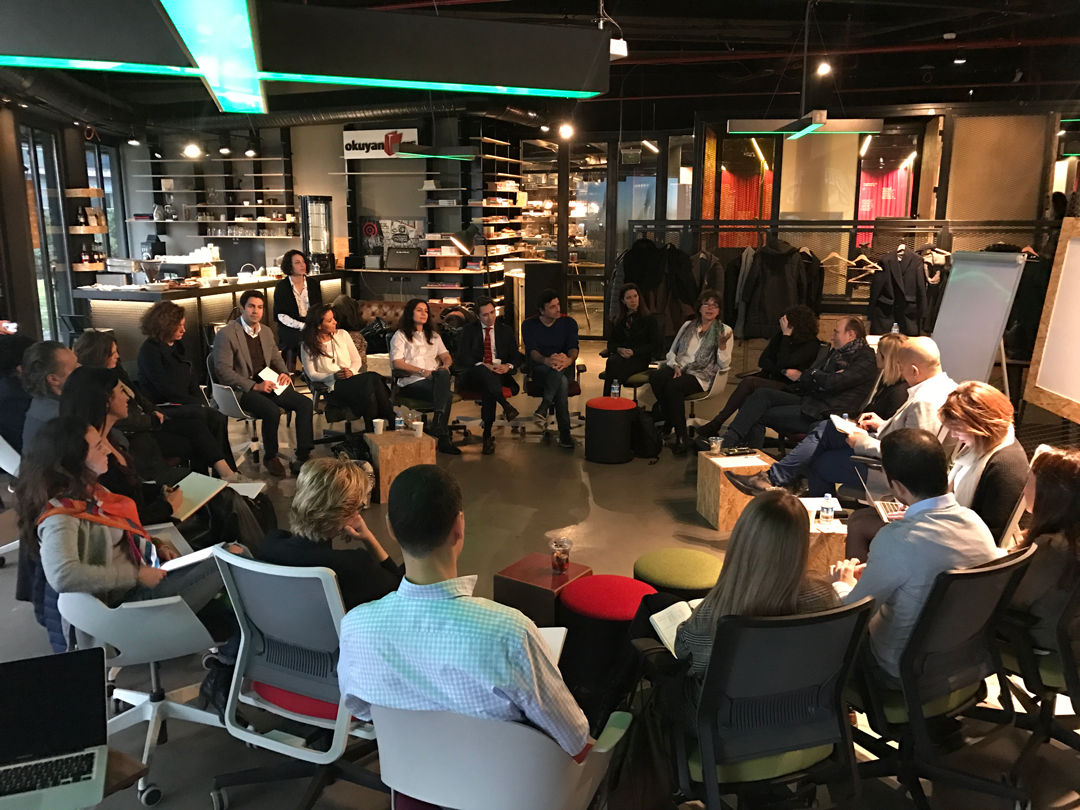
3-Cultural Transformation with Code of Ethics
Businesses need a code of ethics. With abundance of information, transparency and decentralised accountability systems on the rise, employees, individuals and communities themselves put pressure on organisations to follow a code of ethics, which should be agreed upon.
Communities: For a great illustration of that concept, look at the startup “Rentlogic” which gathers records of New York landlords’ good behaviour, bringing down the price up or down. Uber provides a strong incentive for drivers and passengers to behave well with the rating system. The same can be observed with ‘reviewing’ systems such as ‘Yelp’, ‘Ebay’ and so on… We see the rise of the Wikipedia as a means of decentralising the hegemony of encyclopaedias, blogs and social media disrupting the traditional press media, in which large institutions are struggling. Or how Airbnb has disrupted the monopoly of hotels by building a “trust” network. Blockchain is a good example of decentralised value systems.
It’s my strong belief that a platform should be built to have companies observe a code of ethics based on a variety of metrics such as, how they treat their employees and customers, are they impact the environment, wellbeing of future generations and so on…
Employees: As humans we are incredibly social creatures, who constantly observe the people around them and imitate them. Companies have great power to steer people, by providing them with better patterns to imitate. What you say to your employees is less important than what you do. The ancient Greek word for ethics is actually the same word for habit. Your employees will watch how you behave, how you treat others, how you cope with pressure and whether you follow through on your promises. And they will imitate you. If you talk about ethics and then cut corners at the first opportunity, they will follow your lead. Set a good example and they will follow it.
You also need to keep track of your progress, to see how you’re doing. Ancient Greeks learned to keep accounts of them. They would track their daily behaviour in journals, keeping account of how many times they lost their temper, for example. Take an evidence-based assessment of our performance. We might say we’re a green company, but how do we know if we’re making progress? We might say we’re a eudemonic organisation, but how do we know? We can keep track of this, for example by asking our employees (anonymously) how worthwhile they feel their job is. Then see if, in a year, we have managed to enhance their sense of purpose.
That’s why, as the company grows, the human resources (or as we call it; ’human development’) department is integral for showing new hires and current employees what company priorities are. Those priorities should be reflected in all Human Development processes including recruiting, performance evaluations, promotions, and rewards. For example, Zappos has a four-week course for new hires in which they learn about the company philosophy and history. At the end, they are offered $2,000 to quit, and clearly many decide to stay.
4-Good Life Design
I’ve met, worked with or interviewed hundreds of people who have used ancient Sufi; Greek and Roman philosophies to help them live their lives better, including business leaders, entrepreneurs, authors, politicians, academicians and athletes. They all used philosophy to help them achieve “the good life”.
The defining of human needs is a philosophical one, we can see this only after a strong investigation to what a human can desire in a non-industrial era. Philosophy is unavoidable for humans, since even efforts to remain ignorant and reject philosophical thinking are still haunted by its problems. In truth, how can we not philosophise?
5-Rise of Exponential Humanity
Recently philosophy has made its way to score boards; WEF announced in the Future Of Jobs Report, 2017; complex problem solving, critical thinking and creativity are the most important top 3 skills for near future. That’s because never before have we had such an unknown future; a dozen technologies all accelerating in their own right, each one is doubling at a rate of anywhere between 18 to 30 months. But where they intersect, that adds a whole other multiplier to the equation. In technology after technology, the cost is crashing to near zero, which means anybody has access to these technologies. This is a huge opportunity but also massive stress, for all of us.
Technology is a key driver in our Socratic designs; we focus on how technology can serve not only humanity. We can only develop services and product that are human when we have a clear idea about the way humans can use newest digital and non-digital technology in the realisation of their authentic desires. We do not go for the Silicon Valley philosophy of robotics; it will be wiser to develop an enhanced humanity project or rise of exponential humanity using exponential technology to live better lives. In Socratic Design Innovation Workshops, we help companies to create new products, services and apps that can broaden your spectrum. We incorporate the knowledge of the company, by using new ways of questioning and new assumptions we can develop new frames that fit in the actual world of prosumers. Most methods start from the needs of the clients, not questioning whether these are real needs, or serve to the sustainable wellbeing of humanity. The Socratic design method investigates real needs and questions of the company, and will arrive at Philosophical reflection. A concrete roadmap of how to realise this mission is part of the end product.
Final Word
Philosophy is not only to theorise about the world, but also to change it. Purpose of philosophy is to articulate the real problems that exist, but have not yet been articulated. Typical leaders in power who seek to attain goals without philosophy are not necessarily successful at changing reality, because they often maintain the status quo. True transformation seeks to destroy false conscience, and articulates something in the present that beckons the future. With philosophy we can articulate a transformation of the world that has already occurred and needs speech. The meaning must be articulated in speech so that one may act, and that transformative action can only occur with theory that reflects the meaning within the organisation, society and future generations; children of this world.
In these volatile times every company needs to know and internalise its purpose, promises and values reflected on scenarios. The mission is about your challenge, your position and your value in these scenarios, and the most important question to ask is ‘What do we want to contribute?’. Successful companies and game changers of tomorrow will be the ones with good values, moral and ethical codes taking in consideration sustainable personal and communal growth.
